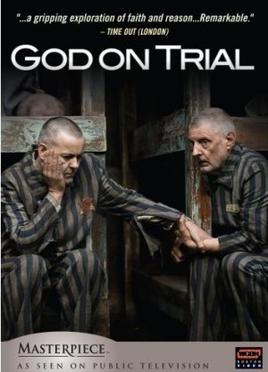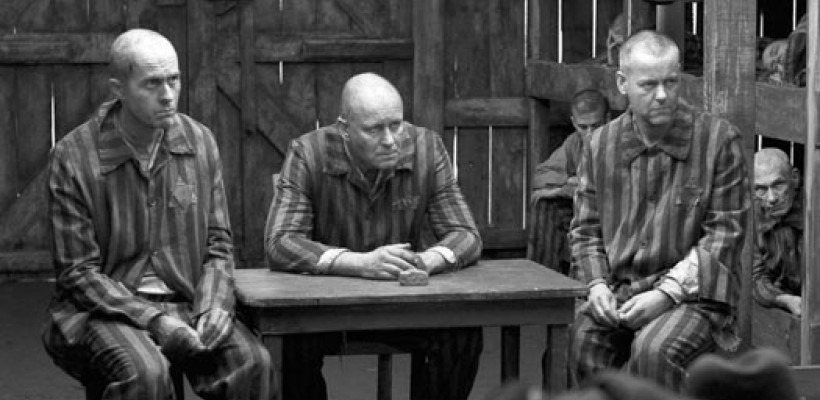On the side of the house grows a sprawling vine, spilling over the fence from the neighbor’s unkempt yard. It has many delicate flowers of deep purple. They apparently need very little water. They ask for nothing, yet they give everything to anyone who knows how to look and feel.
I felt today that that purple color must be the most beautiful color on Earth. Taking a short meditation in the meter-wide space between the house and the fence before the flowers close in the hot California sun, I was reminded of the saying: “Color is God.” What does it mean?

A film I watched with a friend last night remains with me today: “God On Trial.” It was Masterpiece movie taken from a play by the same name, and is the story of a formal trial conducted at Auschwitz by a group of Jewish men.
About half of the men had been selected for death in the gas chamber the next day, lending poignancy and urgency to the trial. The question: Was God in breach of his covenant with the Jewish people?
The story was long thought to be apocryphal, but in 2008, eight years before his death, the Nobel Laureate Elie Wiesel said, “I was there when God was put on trial.”
“Putting God On Trial” does much more than condemn God for breaking his covenant and abandoning the Jewish people. The characters, as
in the camps, were educated and uneducated men, theists and atheists, men who were angry, accepting or resigned to their fate. It is both a meditation on evil, and on the nature of God.
The play is introduced with the line: “They tried the person they thought most responsible for their catastrophe.”
“What is the charge?” To which a condemned man replies: “Are you blind? Murder. Collaboration.”
Beyond the anthropomorphizing of God, there is a real attempt to understand how any God could let the Holocaust happen. The believers trot out the usual tropes: “We are Jews; we suffer.” “We are being tested.” “It’s because of our sins.”
The arguments become subtler. “Hitler will die, the war will end. God is like a surgeon that has to remove an arm or leg, not as punishment but as purification.”
Some scoff. One answers: “God reserves the right to punish the wicked, but He punishes the good and lets the wicked like Hitler go free.”
A long-time prosecutor brings the arguments back to reality: “We aren’t talking about the mind of God; the charge is breach of covenant.”
However they cannot help but inquire into the mind of God, though some deny that God exists at all. The trial distills down into three compelling scenes.
In the first, a father who tries to save his three sons as they are being taken from him is given a Sophie’s choice: Pick one.
He leaves his listeners in the dark, where we all are, refusing to say what he did. Instead he speaks of the beauty of a spring morning even in Auschwitz, and says, “I don’t know why this is happening, but God is here, I know He is here. I felt God that morning, but the guards could not.” Color is God.
A scholar of Jewish history walks the men through the slaughters by the Jewish people of entire cities that the Torah details. “Now we are being slaughtered,” he says. “Yes,” another replies, “the German guards have ‘God is with us’ on their belt buckles.”
The trial takes a turn. The message is clear: Peoples make God in their own image, and put into his mouth the evils that erupt from their own minds.
A physicist stands and speaks of how many stars are in this galaxy alone: “There are 100,000 million stars in our galaxy, and God’s whole attention is on one planet, and then just with the Jews?” he rhetorically asks.

The prosecutor whispers his secret to the other two judges, telling them, “I was a Jew-hating German. I didn’t know I had a Jewish grandfather until they came for me. They have taken everything from you…don’t let them take your God too, even if he doesn’t exist. Let there be something they can’t take from you.”
That strikes a false note as the play ends. Earlier, someone spoke the truth: “The mistake is to make this personal.” That diagnosis and prescription is dismissed too glibly: “What is a God that isn’t personal? It is weather,” someone says.
Not true. God is not a person, and is not personal. The personal is the source of evil and suffering; understanding things non-personally is the way out.
God is not a being, but being. There is cosmic intelligence and love. Does it care about us? We are people, human beings, potentially at least. God needs us to care.
Martin LeFevre
Link for “God On Trial”: https://www.youtube.com/watch?v=tD7v9phroGM
The post Putting God On Trial first appeared on The Costa Rican Times.
No comments:
Post a Comment